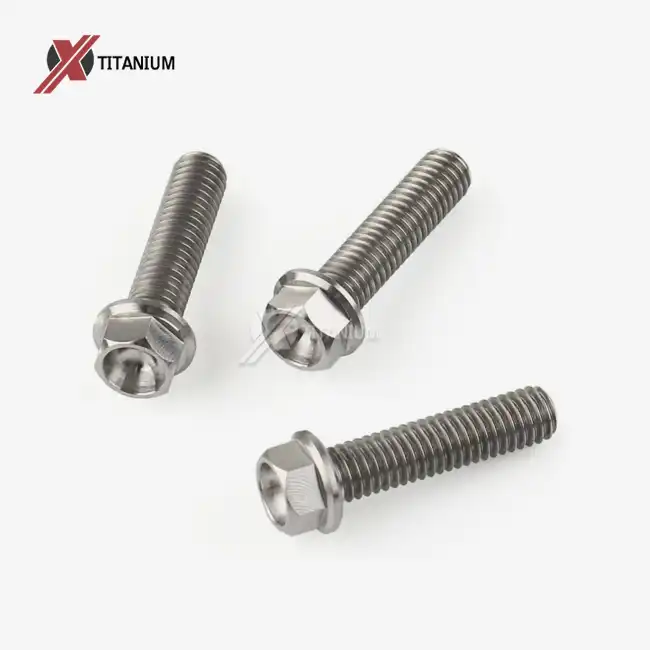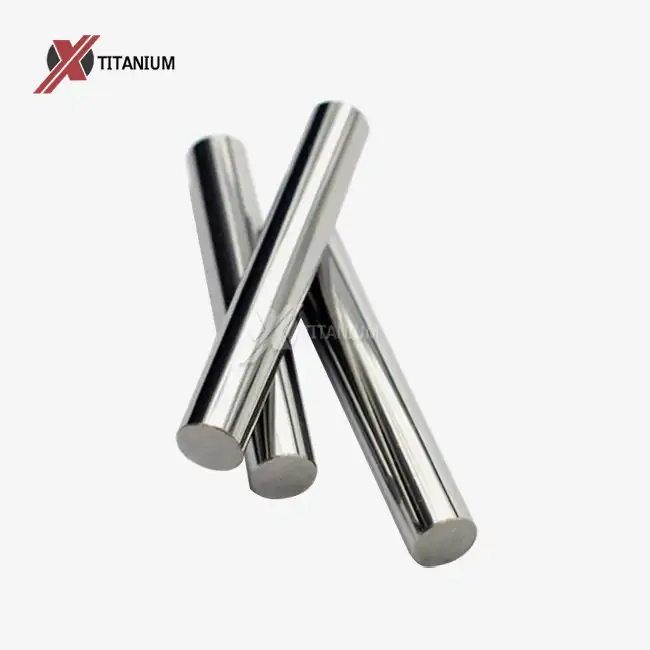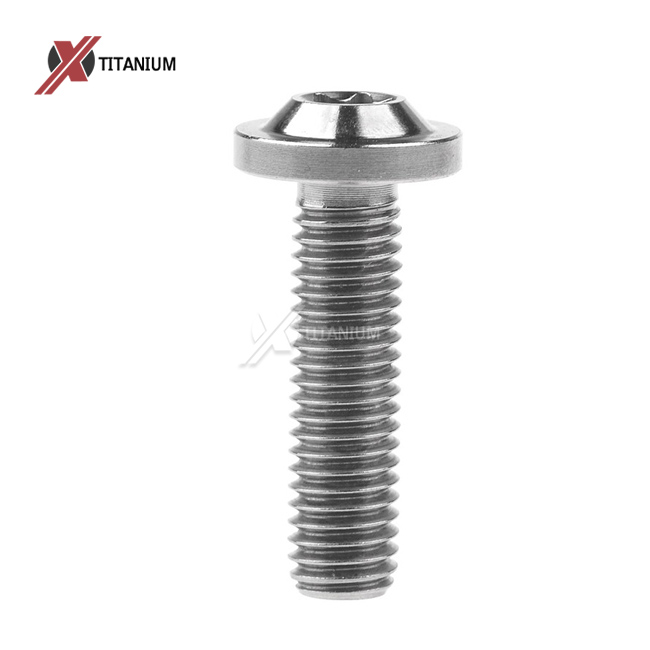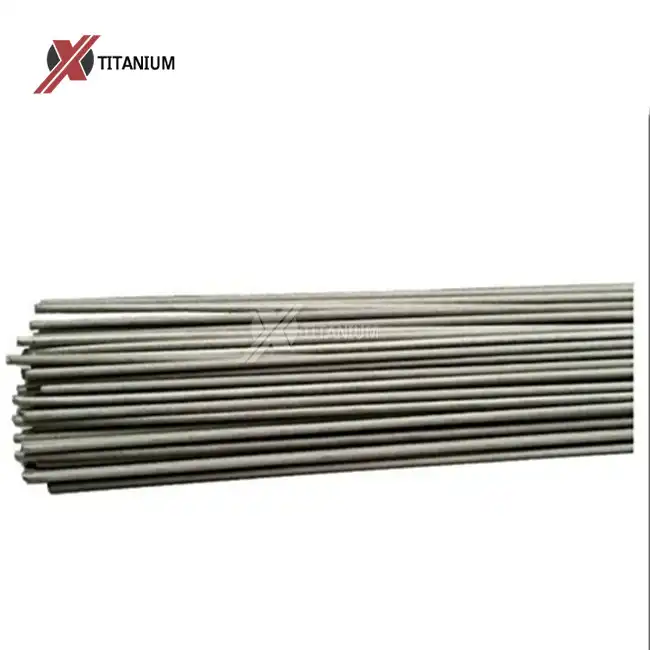When evaluating longevity between titanium alloy bolts and carbon steel fasteners, titanium emerges as the clear winner in most demanding applications. Titanium alloy bolts typically last 2-5 times longer than carbon steel counterparts in corrosive environments, with some aerospace applications showing service lives exceeding 30 years without replacement. Carbon steel bolts, while cost-effective initially, often require replacement every 5-10 years in harsh conditions due to corrosion and fatigue. The superior corrosion resistance, strength-to-weight ratio, and temperature stability of titanium make it the preferred choice for industries prioritizing long-term reliability over initial investment costs.

Understanding Material Composition and Properties
The fundamental difference between these materials lies in their atomic structure and alloy composition. Titanium alloy bolts, particularly Grade 5 (Ti6Al4V), contain 90% titanium, 6% aluminum, and 4% vanadium. This precise combination creates exceptional mechanical properties that surpass traditional steel fasteners.
Carbon steel derives its strength from iron-carbon combinations, typically containing 0.3-2.1% carbon content. While this provides good tensile strength, the material remains vulnerable to oxidation and environmental degradation. Manufacturing processes for both materials differ significantly, with titanium requiring specialized machining techniques and controlled atmospheres.
Three core differences distinguish these materials:
- Density: Titanium alloys weigh 45% less than steel equivalents
- Corrosion resistance: Titanium forms protective oxide layers naturally
- Temperature performance: Titanium maintains strength at elevated temperatures
If you need fasteners for extreme environments where weight reduction matters, titanium alloy bolts prove more suitable. Traditional applications with standard environmental conditions often accommodate carbon steel effectively.
Corrosion Resistance Comparison
Corrosion resistance represents the most significant factor affecting fastener longevity. Laboratory testing reveals titanium's exceptional performance in various environments. Salt spray testing (ASTM B117) shows titanium bolts maintaining structural integrity after 3,000+ hours, while carbon steel specimens show visible corrosion within 24-48 hours without protective coatings.
Marine applications demonstrate this difference dramatically. Offshore platform operators report titanium fasteners lasting 25-30 years in seawater exposure, compared to 3-7 years for coated carbon steel alternatives. The natural oxide film (TiO2) on titanium surfaces provides self-healing protection against chemical attack.
Chemical processing environments present another challenging scenario. Titanium alloy bolts resist acids, alkalis, and organic compounds that rapidly degrade steel fasteners. Petrochemical facilities utilizing titanium fastening solutions report maintenance cost reductions of 40-60% over 10-year periods.
If you need fasteners for marine engineering or chemical processing applications, titanium provides unmatched corrosion protection. Standard industrial environments with controlled atmospheres may accommodate properly treated carbon steel fasteners.
Strength and Load-Bearing Capacity Analysis
Mechanical properties directly impact fastener performance under operational loads. Grade 5 titanium alloy bolts exhibit tensile strength ranging from 895-1,070 MPa, compared to high-strength carbon steel at 800-1,200 MPa. However, titanium's superior strength-to-weight ratio delivers equivalent load-bearing capacity at significantly reduced mass.
Fatigue resistance testing reveals titanium's advantages in cyclic loading applications. Aerospace fasteners experience millions of stress cycles during service life. Test data shows titanium bolts withstanding 10^7 cycles at 60% ultimate tensile strength, while comparable carbon steel fasteners fail at similar stress levels after 10^6 cycles.
Temperature effects on mechanical properties favor titanium significantly. At 300°C, titanium alloys retain 80-85% of room temperature strength, while carbon steel experiences 20-30% strength reduction. This temperature stability proves crucial for aerospace fasteners and energy sector applications.
Load-bearing capacity comparison reveals:
- Titanium: 140-160 MPa yield strength per gram
- Carbon steel: 85-95 MPa yield strength per gram
- Fatigue limit: Titanium 500-600 MPa, Carbon steel 300-400 MPa
If you need high-performance fasteners for aerospace or automotive applications where weight matters, titanium alloy bolts deliver superior strength-to-weight performance. Heavy industrial machinery applications may benefit from carbon steel's absolute strength characteristics.
Temperature Performance and Environmental Stability
Operating temperature ranges significantly influence fastener selection decisions. Titanium alloy bolts maintain structural integrity across extreme temperature variations, from cryogenic conditions (-253°C) to elevated temperatures (600°C). This thermal stability makes them indispensable for aerospace fasteners and energy applications.
Carbon steel fasteners experience thermal expansion coefficients 40% higher than titanium, creating potential stress concentrations in mixed-material assemblies. Thermal cycling tests demonstrate titanium's dimensional stability, with minimal permanent deformation after 1,000 heating-cooling cycles between -50°C and 400°C.
Environmental stability encompasses more than temperature resistance. Titanium's biocompatibility makes it essential for medical device applications, where human tissue compatibility remains paramount. Carbon steel cannot match this biological inertness, limiting its use in medical implants and surgical instruments. Oxidation resistance testing shows dramatic differences between materials. Titanium forms stable oxide layers that prevent further degradation, while carbon steel requires protective coatings or sacrificial anodic protection systems.
Cost-Effectiveness and Long-Term Value
Initial procurement costs favor carbon steel fasteners significantly, with titanium bolts costing 5-10 times more than steel equivalents. However, total cost of ownership calculations reveal different economic realities. Life-cycle cost analysis considers replacement frequency, maintenance requirements, and operational downtime costs.
A 20-year cost comparison for offshore applications shows:
- Carbon steel: Initial cost + 4-6 replacements + maintenance = 300-400% of titanium initial cost
- Titanium: Single installation with minimal maintenance = 100% baseline cost
- Operational savings: Reduced downtime worth 50-100% of material costs
Manufacturing processes affect overall project economics. Carbon steel fasteners require additional surface treatments, protective coatings, and quality inspections. Titanium alloy bolts often ship ready for installation with minimal secondary processing requirements.
Supply chain considerations impact procurement strategies. Carbon steel availability exceeds titanium significantly, but quality titanium suppliers provide consistent material properties and traceability documentation essential for critical applications.
Industry-Specific Applications and Requirements
Different industries prioritize specific fastener characteristics based on operational requirements. Aerospace applications demand lightweight, high-strength fasteners capable of withstanding extreme conditions. Commercial aircraft utilize thousands of titanium fasteners, contributing to fuel efficiency through weight reduction.
Medical device manufacturing requires biocompatible materials for implants and surgical instruments. Titanium's biological inertness and corrosion resistance make it indispensable for orthopedic implants, dental fixtures, and surgical hardware. Carbon steel cannot meet biocompatibility standards for human implantation.
Marine engineering applications expose fasteners to saltwater corrosion continuously. Shipbuilding companies increasingly specify titanium for critical structural components, despite higher initial costs. The extended service life justifies the investment through reduced maintenance and replacement requirements.
Petrochemical processing environments present unique challenges combining high temperatures, corrosive chemicals, and pressure cycling. Titanium fasteners excel in these demanding conditions, providing reliable service where carbon steel would require frequent replacement. Consumer electronics manufacturers value titanium's aesthetic properties and lightweight characteristics. Premium devices incorporate titanium fasteners for enhanced durability and visual appeal, while maintaining compact form factors.
Surface Treatments and Protective Coatings
Surface treatment options differ significantly between titanium and carbon steel fasteners. Titanium alloy bolts benefit from anodizing, nitriding, and polishing processes that enhance appearance and performance characteristics. These treatments create decorative colors while maintaining the base material's corrosion resistance. Carbon steel fasteners require protective coatings for corrosion resistance. Zinc plating, hot-dip galvanizing, and organic coatings extend service life but add processing steps and environmental considerations. Coating failures expose the underlying steel to rapid corrosion progression.
CNC machining capabilities affect surface quality and dimensional accuracy. Titanium requires specialized tooling and cutting parameters but produces excellent surface finishes directly from machining operations. Carbon steel machines more easily but may require additional finishing steps. Quality control procedures for surface treatments vary between materials. Titanium's inherent properties require minimal testing, while coated carbon steel demands adhesion testing, thickness measurements, and coating integrity verification.
Choose Chuanglian for Premium Titanium Alloy Bolts
Baoji Chuanglian New Metal Material Co., Ltd. stands as your trusted titanium alloy bolts manufacturer, delivering precision-engineered fastening solutions for the world's most demanding applications. Our comprehensive manufacturing capabilities encompass Grade 5 (Ti6Al4V) titanium alloy bolts with customizable specifications, surface treatments, and dimensional requirements.
Located in Baoji City, renowned as the "City of Titanium," our facility leverages over ten years of specialized experience in titanium processing and machining. Our state-of-the-art CNC machine tools and mechanical processing equipment ensure consistent quality and precision for every order.
Quality assurance protocols include strict material traceability, comprehensive testing capabilities, and certifications meeting AS9100, ISO9001, and medical device standards. Our titanium alloy bolts undergo rigorous inspection procedures from raw material receipt through finished product delivery.
Key advantages of partnering with Chuanglian include:
- Customizable dimensions, threads, and surface treatments
- Multiple color options including natural titanium, gold, blue, green, purple, black, and rainbow finishes
- Comprehensive technical support for material selection and application guidance
- Reliable delivery schedules with quality documentation
- Competitive pricing for high-value titanium fastening solutions
Our customer base spans aerospace manufacturers, petrochemical processors, medical device companies, and marine engineering firms worldwide. Each relationship represents our commitment to quality foremost methodology and technical excellence.
Conclusion
The longevity comparison between titanium alloy bolts and carbon steel clearly favors titanium for demanding applications. Superior corrosion resistance, exceptional strength-to-weight ratio, and temperature stability deliver 2-5 times longer service life in harsh environments. While initial costs favor carbon steel, life-cycle cost analysis reveals titanium's economic advantages through reduced maintenance and replacement requirements.
Carbon steel remains viable for standard applications with controlled environments and cost constraints. However, mission-critical installations, aerospace fasteners, marine applications, and medical devices benefit significantly from titanium's superior performance characteristics. The choice ultimately depends on application requirements, environmental conditions, and total cost of ownership considerations rather than initial procurement costs alone.
Ready to explore premium titanium fastening solutions for your next project? Our technical team provides expert consultation on material selection, application requirements, and custom specifications. Contact us at info@cltifastener.com or djy6580@aliyun.com to discuss your titanium alloy bolts requirements and receive detailed technical specifications.
References
1. Boyer, R. R. (1996). An overview on the use of titanium in the aerospace industry. Materials Science and Engineering: A, 213(1-2), 103-114.
2. Lutjering, G., & Williams, J. C. (2007). Titanium: Engineering Materials and Processes. Springer Science & Business Media.
3. Donachie, M. J. (2000). Titanium: A Technical Guide, 2nd Edition. ASM International.
4. Peters, M., Kumpfert, J., Ward, C. H., & Leyens, C. (2003). Titanium alloys for aerospace applications. Advanced Engineering Materials, 5(6), 419-427.
5. Rack, H. J., & Qazi, J. I. (2006). Titanium alloys for biomedical applications. Materials Science and Engineering: C, 26(8), 1269-1277.
6. Schutz, R. W., & Thomas, D. E. (1987). Corrosion of titanium and titanium alloys. Metals Handbook, 9th Edition, Volume 13: Corrosion, ASM International, 669-706.


_1747364352357.webp)
